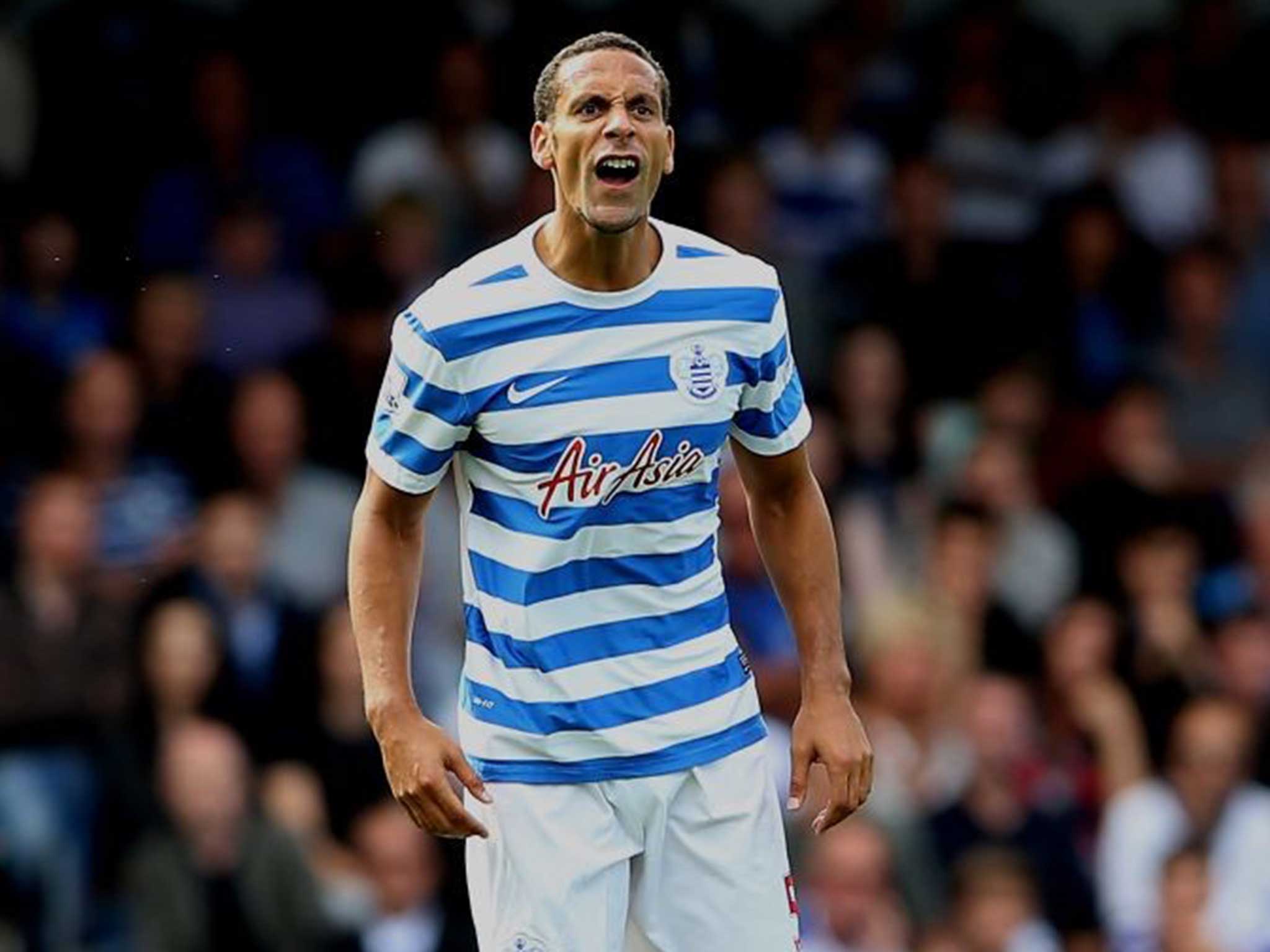Your support helps us to tell the story
From reproductive rights to climate change to Big Tech, The Independent is on the ground when the story is developing. Whether it's investigating the financials of Elon Musk's pro-Trump PAC or producing our latest documentary, 'The A Word', which shines a light on the American women fighting for reproductive rights, we know how important it is to parse out the facts from the messaging.
At such a critical moment in US history, we need reporters on the ground. Your donation allows us to keep sending journalists to speak to both sides of the story.
The Independent is trusted by Americans across the entire political spectrum. And unlike many other quality news outlets, we choose not to lock Americans out of our reporting and analysis with paywalls. We believe quality journalism should be available to everyone, paid for by those who can afford it.
Your support makes all the difference.When Rio Ferdinand returns to Old Trafford with Queens Park Rangers this afternoon, nothing much apart from the sign on the dressing-room door will appear to have changed. There will be the same walk to the pitch, the same invitation to the rather small players’ lounge after the match, the sound of the same crowd he played in front of for more than a decade.
And yet in the three months since Ferdinand left Manchester United, after being told in the dressing room after the final game of the season that he would not be offered a new contract, the club has changed utterly and maybe for ever.
When Ferdinand first came to Old Trafford from Leeds wearing a white suit “subtly pin-striped” that Sir Alex Ferguson thought ridiculous for the signing of the world’s most expensive defender, Manchester United ran on smooth, almost predictable lines.
The core of the squad was still the Class of 92, the greatest youth-team side English football may ever see. Each summer Ferguson would make one marquee signing to strengthen a specific position. The deal would be expensive and done early. The year before Ferdinand’s arrival, United had signed Juan Sebastian Veron for £28m and, before that, Ruud van Nistelrooy from Feyenoord.
That template has been smashed to pieces in the space of a few weeks as Louis van Gaal authorised £157m of spending to completely rebuild the most successful club in English football.
Perhaps too much attention has focused on the men Van Gaal has brought in and how Angel Di Maria and Radamel Falcao will fit in alongside Robin van Persie, Wayne Rooney and Juan Mata – and not enough on those who have gone.
There have been 14 departures and if Van Gaal thought Danny Welbeck and Tom Cleverley were not good enough, he argued that radical surgery was needed to improve the atmosphere in the home dressing room. “You have seen Tyler Blackett play, Anders Lindegaard play, James Wilson play,” said Van Gaal, who has been angered by suggestions he has ditched Manchester United’s philosophy of trusting in youth.
“When you see my line-ups there are several young players who have played already, so I don’t think I have changed my philosophy. We have changed the selection to give a new rhythm to our dressing room.
“When you are a substitute for two or three years, do you think it is a good thing for players? I don’t think so. So my philosophy is that you have to sell or loan them. It is better for them and better for the atmosphere in the dressing room. We have brought six players and let go 14, so there are eight vacancies for young players.
“But [whether they take them] depends on the young players at Manchester United. I cannot change that. There is already a structure at Manchester United but I have asked a lot of questions of them.”
Van Gaal will always point out that his Ajax side that won the European Cup in 1995 contained some of the most dazzling young talents Dutch football has produced, while At Barcelona he opened the door to Andres Iniesta, Xavi Hernandez and Carles Puyol.
The irony was that Van Gaal was speaking in the new building at United’s training centre at Carrington named after Jimmy Murphy, the man who nurtured Sir Matt Busby’s Babes. On one wall is a plaque commemorating Manchester United’s young players of the year. The award for 2008 went to Welbeck.
“I have said he didn’t reach the standards of Van Persie and Rooney,” Van Gaal reflected. “He had chances for three years and always Van Persie or Rooney was playing. In the previous system only Van Persie played in the striker’s position, but in my system I play two forwards so there is a vacancy to two players brought out of the youth system – Wilson for example or Adnan Januzaj and we have bought Falcao.”
Van Gaal concedes that, for all the spending, Manchester United is still unbalanced, especially in defence and following the loss of Phil Jones during England’s victory in Switzerland it has become even more lop-sided. The fact remains, however, that United’s first three games against very beatable opposition have brought two goals. “I think we have to pass much quicker,” said Van Gaal. “We have lost the ball too much and too early.”

Join our commenting forum
Join thought-provoking conversations, follow other Independent readers and see their replies
Comments